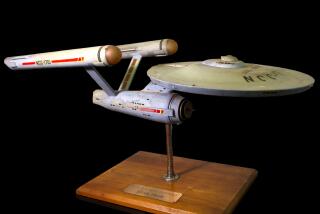Star Trek’ Entered Our Homes, Pointing Us Toward the Possible
- Share via
With “Star Trek IV, The Voyage Home” rapidly becoming a major success at the box office and in the reviews, it is time to set the record straight on a point still missed by many: there are significant numbers of serious “Star Trek” fans who have never been to a “Star Trek” convention in costume, and who own not a single set of synthetic pointed ears.
This is not to belittle those who do enjoy such theatrical indulgences--indeed their enthusiasm has been materially responsible for keeping the television series alive for two decades. But the visible “Trekkies” alone could not produce the box office results this latest installment is now enjoying without the concurrent (but lower profile) support of those who have long admired the inestimable value of the show and the concepts it represents.
The innovative TV production that splashed into the nation’s living rooms 21 years ago was nothing if not instantly inspiring, and in the fertile minds of bright young kids to whom visions of spaceflight and the possibility of distant worlds defined well-trod pathways of the imagination, “Star Trek” instilled one profound lesson: It is OK to engage in serious and optimistic speculation about things yet to be experienced by humankind--such as the possibility of interstellar space travel and extraterrestrial civilizations.
“Star Trek” was indeed a celebration of the possible--a collection of teleplays showing imperfect humans dealing with human challenges. But it also was the first TV series about science fiction that did not insult our intelligence. It broke tradition because it refused to react to our usual nervousness over deeper questions of the Cosmos (and our role within it) by making a crude burlesque of the subject. For a nation that was financing the heroic efforts of real scientists and astronauts to meet President John F. Kennedy’s moon landing challenge, the normal, insipid television treatment of science fiction (nonsense such as the series “Lost in Space”) had become very tiring--and insulting.
“Star Trek” had the audacity (or the courage) to treat “starships” as if they might really exist in some future century. This was the stuff of Issac Asimov, Robert Heinlein, and Arthur Clarke, the deans of serious science fiction. Here at last was a series in which things didn’t just happen, but in which each gadget and each event was supported by a postulated scientific explanation--as far fetched as some of them might have seemed.
The flaws of the series were there, and they can be argued endlessly. But the inestimable contributions of the show in broadening our horizons, opening our minds and raising the right questions were there too. On the frontiers of science, in our democratic institutions, in our classrooms and in our military are thousands of people who have been affected by the ideas, the optimism and the humanity of “Star Trek,” and what it had to say about the future (indeed with worldwide distribution of the reruns and the movies, that number continues to grow). The fact that such individuals should want to revisit fondly and often those distant landscapes is the element of continuity that will keep future productions of “Star Trek” viable and valuable.
More to Read
The complete guide to home viewing
Get Screen Gab for everything about the TV shows and streaming movies everyone’s talking about.
You may occasionally receive promotional content from the Los Angeles Times.






